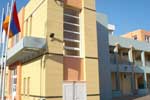Η Στήλη του Σασσουνιαν

Growing Turkish Influence in Middle East Leads to Restrictions in Armenian Rights
Turkey's growing influence in the Middle East, even before the naval confrontation with Israel over Gaza , had prompted some Arab countries to restrict the political rights of local Armenian communities.
It is feared that the latest Gaza conflict, which catapulted Prime Minister Erdogan to a heroic stature throughout the Islamic world, would result in further limitations on Armenian activities deemed to be "anti-Turkish."
In recent months, Jordan , Lebanon and Syria have taken specific actions to place some restrictions on the activities of their Armenian citizens either out of concern for a backlash from Turkey or under direct pressure from Turkish authorities.
A case in point was the Jordanian government's cancellation of AGBU's Middle East Young Professionals Forum that was to take place in Amman , June 3-6. Talin Suciyan, reported in The Armenian Weekly that Jordanian authorities had expressed reservations for the gathering of 150 young Armenians from various parts of the world. Suciyan, who was invited to speak on the "Legacy of Hrant Dink" and the Armenian community in Turkey , stated that the organizers were informed the night before that the forum was canceled by orders "from above." Some observers attributed the cancellation of the AGBU forum to the agreement to set up a Free Trade Zone, which was to be signed between Jordan , Lebanon , Syria , and Turkey , on June 10. A commentator pointed out the irony of Armenian conferences being allowed to take place in Turkey , but not in Jordan !
Earlier this year, when a Lebanese TV crew was about to enter Syria to record footage on "the Armenian killing fields" in Der Zor, border guards refused to admit them, even though they had secured the necessary filming permits from the Syrian authorities in advance. This incident took place shortly after CBS aired in its "60 Minutes" program a segment on the Armenian Genocide. The program depicted the protruding bones of Armenian Genocide victims from the desert sands of Der Zor. Turkish officials lodged a complaint with the Syrian government for allowing CBS to film an "anti-Turkish" program in their country.
The third incident, unexpectedly, took place in Lebanon , home to one of the most influential Armenian communities in the Diaspora. In a surprise move, government officials banned the airing of Eileen Khatchadourian's music video, "Zartir Vortyag," a genocide era song calling for resistance against oppression. Even though the song makes no reference to Turkey , Lebanese authorities were concerned that it would negatively affect Lebanese-Turkish relations.
These are troubling examples of blatant interference with Armenian citizens' right to free expression. In all three countries, Armenians have long enjoyed the most cordial relations with their respective governments and are viewed by them as loyal citizens. Local Armenian community leaders must strongly protest such arbitrary violations of their basic rights as citizens of these countries. They should consider carrying out a campaign to educate their fellow citizens about the extensive damage Turkey has caused to Arab interests for decades, as a close military ally of Israel
Armenians should point out that, despite Erdogan's blistering anti-Israeli rhetoric, he has not canceled any of the 16 agreements with Israel , including the exchange of intelligence, according to Today's Zaman newspaper. Sedat Laciner, head of Ankara-based International Strategic Research Organization, told Hurriyet that the military leaders of the two countries had also signed several secret agreements. According to the Middle East magazine, the intelligence agencies of Israel and Turkey have cooperated "since the 1950's in the fight against radical Islamist groups and Iranian clandestine operations in the region." Furthermore, Turkey was reported to have allowed Israel "to monitor Syrian military maneuvers from Turkish soil." In addition, Turkey awarded $1.8 billion in military contracts to Israeli companies. The total trade turnover between the two countries reached $2.5 billion in 2009. More than 900 large Israeli corporations have been operating in Turkey and over 1,000 small Israeli exporters have established commercial ties with it.
Erdogan has cleverly capitalized on the political vacuum created by the inaction of Arab leaders regarding the plight of the Palestinian people, thus raising his own as well as his party's political rating in advance of the September 12 referendum on constitutional amendments, and next year's crucial parliamentary elections. It is a pity that Arab leaders have totally abdicated their own responsibility, allowing an outsider to claim the mantle of Arab leadership!
Prior to Prime Minister Erdogan's scheduled visit to Lebanon next month, where he might receive an undeserved hero's welcome by some Lebanese, Armenians must expose his hypocritical show of solidarity with Palestinians, and convince their fellow citizens that he is acting in his own, rather than Lebanon's, best interest.
By Harut Sassounian
Publisher, The California Courier




















